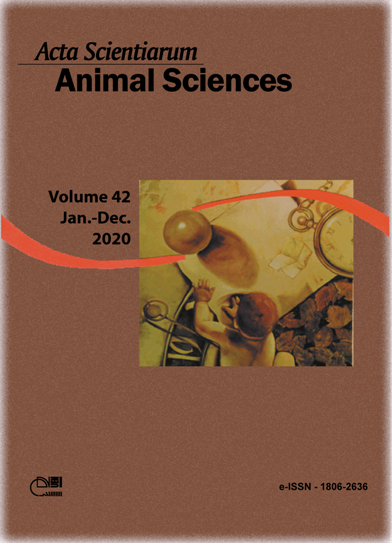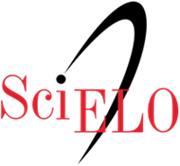Meat quality of Maremmana young bulls
Resumo
Maremmana is a local Italian breed reared in southern Tuscany and northern Latium. Twenty-two young bulls were reared in pasture system with concentrate supply (PSCS), whereas 20 young bulls were reared in feedlot intensive system (IS) in order test differences between meat typologies. The bulls were slaughtered at 18 months old. The performances at slaughtering were similar between finishing systems. IS bull meat has shown higher cooking loss than PSCS bull meat (p < 0.001), higher moisture content (p < 0.01), and fat (p < 0.001), and lower crude protein (p < 0.001). The SFA, MUFA and PUFA percentage were similar between meat typologies; whereas if considered in mg per 100 gr of muscle MUFA and SFA content was higher in PSCS meat (p < 0.05). Among the Healthy Indices, C18:2/C18:3 was higher in IS System (14.08 vs. 9.77; p < 0.001); the results of the PCA (Principal Component Analysis) of fatty acids composition showed that PSCS meat was characterized by MUFA and SFA, while IS meat was identified by C18:2/C18:3, and ω6/ ω3.
Downloads
Referências
Association Official Analytical Chemistry [AOAC]. (2005). Official Methods of Analysis (18th ed.). Gaitherburg, MD: AOAC International.
Braghieri, A., Girolami, A., Cifuni, G. F., Riviezzi, A. M., Pacelli, C. & Napolitano, F. (2007). Shelf life of meat from Podolian young bulls in relation to the aging method. Journal of Food Quality, 30(4), 496-510. doi: 10.1111/j.1745-4557.2007.00138.x
Casagrande, D.R., Vieira Azenha, M., Vieira, B.R., Dutra de Resende, F., de Faria, M.H., Berchielli, T.T., Ruggieri, A.C. & Reis, R.A. (2013) Performance and carcass quality of feedlot- or pasture-finished Nellore heifers according to feeding managements in the postweaning phase. Revista Brasileira de Zootecnia, 42 (12): 899-908. Doi:10.1590/S1516-35982013001200010
Cozzi, G., Brscic, M. & Gottardo, F. (2009). Main critical factors affecting the welfare of beef cattle and veal calves raised under intensive rearing systems in Italy: a review. Italian Journal of Animal Science, 8(Sup1), 67-80. doi: 10.4081/ijas.2009.s1.67
De la Fuente, J., Díaz, M. T., Álvarez, I., Oliver, M. A., Font i Furnols, M., Sañudo, C., ... Cañeque, V. (2009). Fatty acid and vitamin E composition of intramuscular fat in cattle reared in different production systems. Meat Science, 82(3), 331-337
Dias, A.M.O., De Menezes, L.F.G., Paris, W., Dos Santos, P.V., Biesek, R.R., Mafioletti, R.D., & Marchesan, R. (2017). Productive performance of Holstein calves finished in feedlot or pasture. Anais da Academia Brasileira de Ciências 89(3): 1935-1942. doi: 10.1590/0001-3765201720170115
Di Lorenzo, P., Lancioni, H., Ceccobelli, S., Colli, L., Cardinali, I., Karsli, T., ... Marsan, P. A. (2018). Mitochondrial DNA variants of Podolian cattle breeds testify for a dual maternal origin. PloS One, 13(2), e0192567. doi: 10.1371/journal.pone.0192567
Gallo, L., De Marchi, M. & Bittante, G. (2014). A survey on feedlot performance of purebred and crossbred European young bulls and heifers managed under intensive conditions in Veneto, northeast Italy. Italian Journal of Animal Science, 13(4), 3285. doi: 10.4081/ijas.2014.3285509
Harries, J. M., Hubbard, A. W., Alder, F. E., Kay, M. & Williams, D. R. (1968). Studies on the composition of food: 3. The nutritive value of beef from intensively reared animals. British Journal of Nutrition, 22(1), 21-31.
Holló, G., Nuernberg, K., Somogyi, T., Anton, I. & Holló, I. (2012). Comparison of fattening performance and slaughter value of local Hungarian cattle breeds to international breeds. Archives Animal Breeding, 55(1), 1-12. doi: 10.5194/aab-55-1-2012
Ito, R. H., Prado, I. N., Visentainer, J. V., Prado, R. M., Fugita, C. A. & Pires, M. C. O. (2010). Carcass characteristics, chemical and fatty acid composition of Longissimus muscle of Purunã bulls slaughtered at 18 or 24 months of age. Acta Scientiarum. Animal Sciences, 32(3), 299-307. doi: 10.4025/actascianimsci.v32i3.7274
Hunt, M., Abraham, W., Marshal, S., Feldman, T., & Francis, A. (2005). AHA/ACC Practice Guidelines. Update for the Diagnosis and Management of Chronic Heart Failure in the Adults. doi: 10.1161/Circulationaha.105.167586.
Kang, M. J., Shin, M. S., Park, J. N., & Lee, S. S. (2005). The effects of polyunsaturated: saturated fatty acids ratios and peroxidisability index values of dietary fats on serum lipid profiles and hepatic enzyme activities in rats. British Journal of Nutrition, 94(4), 526-532. doi: 10.1079/BJN2005152
Marino, R., Albenzio, M., Caroprese, M., Napolitano, F., Santillo, A. & Braghieri, A. (2011). Effect of grazing and dietary protein on eating quality of Podolian beef. Journal of Animal Science, 89(11), 3752-3758. doi: 10.2527/jas.2010-3699
Marino, R., Albenzio, M., Girolami, A., Muscio, A., Sevi, A., & Braghieri, A. (2006). Effect of forage to concentrate ratio on growth performance, and on carcass and meat quality of Podolian young bulls. Meat Science, 72(3), 415-424. doi: 10.1016/j.meatsci.2005.08.007
Nogales, S., Bressan, M. C., Delgado, J. V., Telo da Gama, L., Barba, C., & Camacho, M. E. (2017). Fatty acid profile of feral cattle meat. Italian Journal of Animal Science, 16(1), 172-184. doi: 10.1080/1828051x.2016.1263163
Özogul, Y., & Özogul, F. (2007). Fatty acid profiles of commercially important fish species from the Mediterranean, Aegean and Black Seas. Food Chemistry, 100(4), 1634-1638. doi: 10.1016/j.foodchem.2005.11.047
Popova, T., Ignatova, M., Petkov, E., & Stanišić, N. (2016). Difference in fatty acid composition and related nutritional indices of meat between two lines of slow-growing chickens slaughtered at different ages. Archives Animal Breeding, 59(3), 319-327. doi: 10.5194/aab-59-319-2016
Sargentini, C., Bozzi, R., Lorenzini, G., Degl’Innocenti, P., Martini, A., & Giorgetti, A. (2010). Productive performances of Maremmana young bulls reared following organic rules and slaughtered at 18 and 24 months of age. Italian Journal of Animal Science, 9(2), e31. doi: 10.4081/ijas.2010.e31
Sargentini, C., Tocci, R., Martini, A., & Bozzi, R. (2018). Morphological characterization of Amiata donkey through Multivariate analyses. Revista Brasileira de Zootecnia, 47, 1-10. doi: 10.1590/rbz4720170310.
Statistical Analysis Software [SAS]. (2004). SAS/STAT User guide, Version 9.1.1. Cary, NC: SAS Institute Inc.
Senso, L., Suárez, M. D., Ruiz-Cara, T., & García-Gallego, M. (2007). On the possible effects of harvesting season and chilled storage on the fatty acid profile of the fillet of farmed gilthead sea bream (Sparus aurata). Food Chemistry, 101(1), 298-307. doi: 10.1016/j.foodchem.2006.01.036
Simopoulos, A. (2016). An increase in the omega-6/omega-3 fatty acid ratio increases the risk for obesity. Nutrients, 8(3), 1-17. doi: 10.3390/nu80301
Simopoulos, A. P. (2002). The importance of the ratio of omega-6/omega-3 essential fatty acids. Biomedicine & Pharmacotherapy, 56(8), 365-379.
Sinanoglou, V. J., Batrinou, A., Mantis, F., Bizelis, I., & Miniadis-Meimaroglou, S. (2013). Lipid quality indices: Differentiation of suckling lamb and kid breeds reared by traditional sheep farming. Small Ruminant Research, 113(1), 1-10. doi10.1016/j.smallrumres.2013.01.008
Średnicka-Tober, D., Barański, M., Seal, C., Sanderson, R., Benbrook, C., Steinshamn, H., ... Eyre, M. (2016). Composition differences between organic and conventional meat: a systematic literature review and meta-analysis. British Journal of Nutrition, 115(6), 994-1011. doi: 10.1017/S0007114515005073
Summer, A., Lora, I., Formaggioni, P., & Gottardo, F. (2019) Impact of heat stress on milk and meat production. Animal Frontiers, 9, 39–46. doi: 10.1093/af/vfy026
Ulbricht, T. L. V., & Southgate, D. A. T. (1991). Coronary heart disease: seven dietary factors. The Lancet, 338(8773), 985-992. doi: 10.1016/j.meatsci.2011.02.035
DECLARAÇÃO DE ORIGINALIDADE E DIREITOS AUTORAIS
Declaro que o presente artigo é original, não tendo sido submetido à publicação em qualquer outro periódico nacional ou internacional, quer seja em parte ou em sua totalidade.
Os direitos autorais pertencem exclusivamente aos autores. Os direitos de licenciamento utilizados pelo periódico é a licença Creative Commons Attribution 4.0 (CC BY 4.0): são permitidos o compartilhamento (cópia e distribuição do material em qualqer meio ou formato) e adaptação (remix, transformação e criação de material a partir do conteúdo assim licenciado para quaisquer fins, inclusive comerciais.
Recomenda-se a leitura desse link para maiores informações sobre o tema: fornecimento de créditos e referências de forma correta, entre outros detalhes cruciais para uso adequado do material licenciado.









































